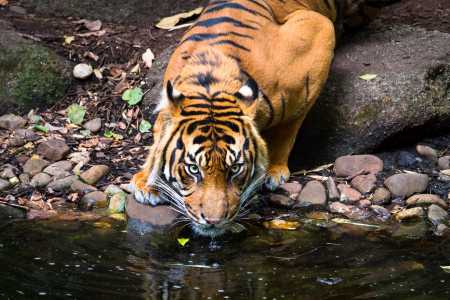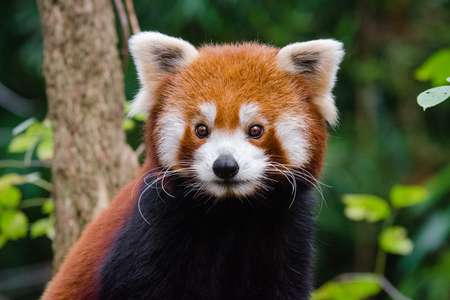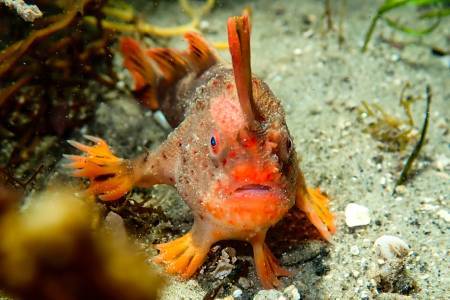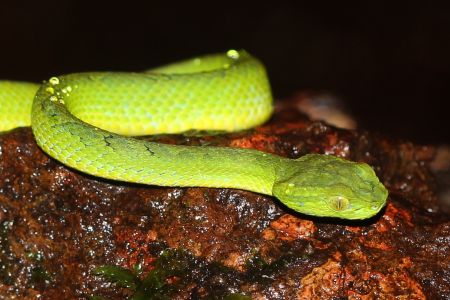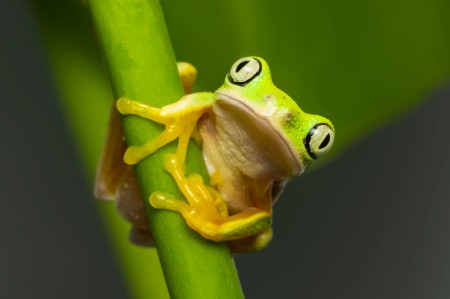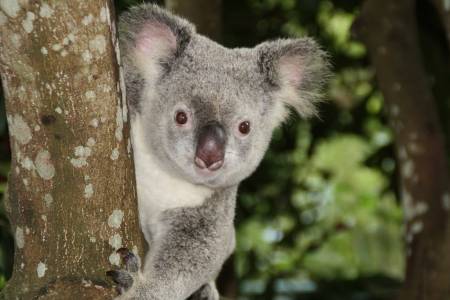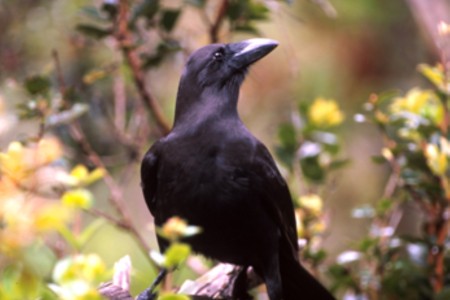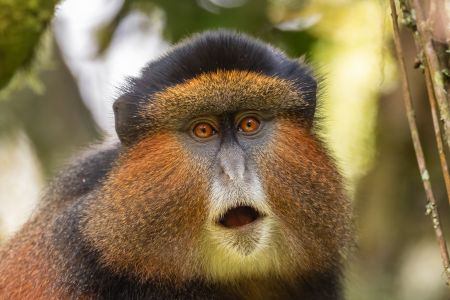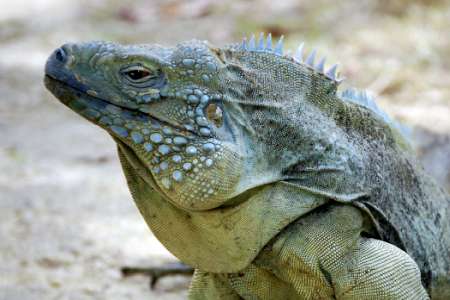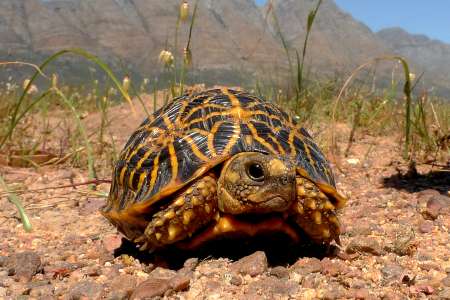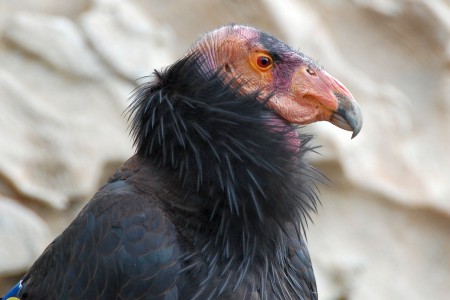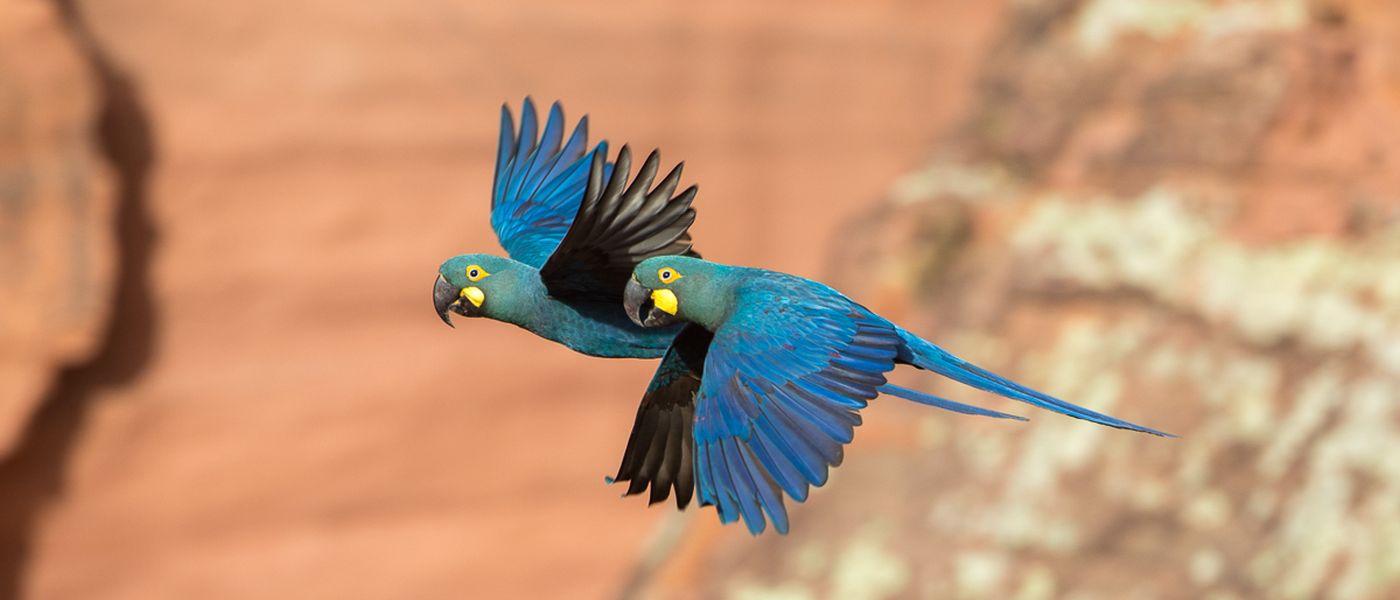
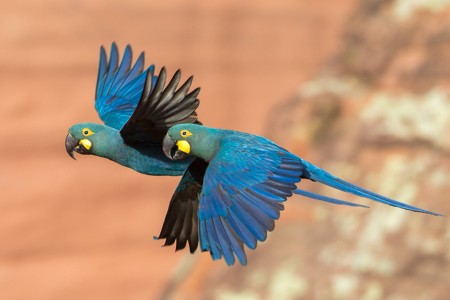
Lear's Macaw
Magnificent Macaws Struggling to Survive

INTRODUCTION
The Lear’s Macaw (Anodorhynchus leari), also known as the Indigo Macaw, is admired for its striking blue plumage. It is considered to be one of the planet’s most spectacular and distinctive bird species.
Scientific classification
• Kingdom: Animalia
• Phylum: Chordata
• Class: Aves
• Order: Psittaciformes
• Family: Psittacidae
• Genus: Anodorhynchus
• Species: A. leari
Appearance and Behavior
Lear’s Macaws are an arresting sight with their predominantly dark metallic blue plumage, which contains almost imperceptible tinges of green running throughout. Their heads are a slightly paler shade of blue. What’s particularly striking about this bird is the pale-yellow patch of skin at the base of its blackish beak, which is echoed in the vibrant orange-yellow rings encircling its eyes. Completing its distinctive appearance are their dark grey-colored feet.
Adults have a weight of around 2 pounds (950 grams), which classifies them as a large member of the macaw species, and a body length of around 28 inches (70 centimeters).
The Lear’s Macaw has the distinctive ability to mimic human speech and replicate various other sounds. This trait, in combination with their vibrant and visually striking appearance, has endeared them to bird enthusiasts, avid ornithologists, and pet owners across the globe. Sadly, collectors have been part of the macaw’s risk of extinction.
Habitat and Ecology
The Lear’s Macaw is endemic to the northeast Bahia of Brazil and can be found in arid, thorny woodland regions, specifically within the unique biome known as the Caatinga. This macaw species has a lifespan of 30-50 years when in their natural wild habitats. In captivity, they can live for a remarkable 60 years. In the wild, they primarily subsist on the nuts of Licuri palms and will travel large distances to locate these trees, thus showing distinct dietary preferences and adaptability.
Lear’s Macaws assemble into impressive flocks for roosting and feeding purposes. These community behaviors also extend to their reproductive habits, where they prefer nesting in large groups along cliff faces while laying one or two eggs per breeding season. Some researchers report they can lay up to three eggs, but usually only two chicks survive.
One aspect of their reproductive process that captures attention is the dramatic courtship displays performed by the male Lear’s Macaws. These involve the males engaging in a series of physical performances, including bowing and emitting loud, captivating vocalizations. The primary aim of these theatrics is to draw the attention and favor of a potential mate and reflect the complexity of their mating rituals, after which the male and female mate for life.
Conservation Status
Lear’s Macaws face serious threats to their survival. Chief among these are habitat destruction from rapid urbanization and illegal trapping for the pet trade. Coupled with its restricted natural habitat, this has created a dangerous risk of species extinction. In response to these concerns, in 2019, The International Union for Conservation of Nature (IUCN) designated Lear’s Macaw as “Endangered” on its Red List of Threatened Species. This highlights the urgent need for intensified conservation actions to safeguard this remarkable bird.
THREATS TO LEAR'S MACAWS
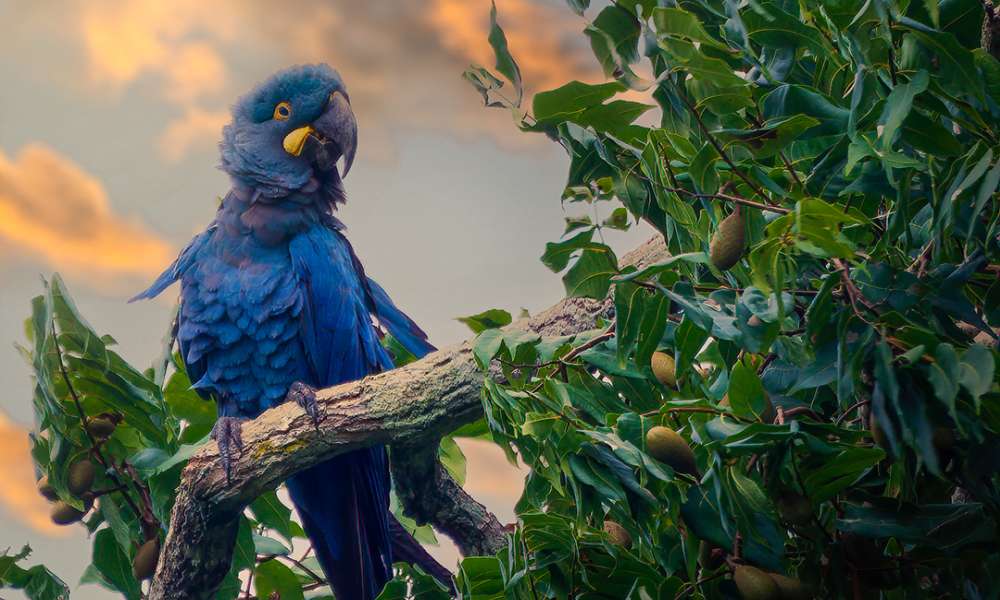
As of 2023, with over 2,000 individuals remaining in the wild, Lear’s Macaw population still remains greatly endangered. Factors such as habitat loss, illegal wildlife trade, climate change, and vulnerability to disease because of reduced genetic diversity are critical drivers of this alarming decline. Their small population size emphasizes the urgency of implementing robust conservation strategies.
Loss of Habitat
Habitat loss presents one of the most significant challenges to the survival of Lear’s Macaw. Widespread deforestation and conversion of land in areas they live in for agricultural and other uses have drastically reduced their natural environment. The removal of Licuri Palm trees, an essential part of the Macaw’s diet, further aggravates this threat. Even with protective regulations in place, adequately safeguarding their habitat in remote areas remains a considerably difficult task for law enforcement.
Climate Change
While the global climate change disaster affects all life on Earth, certain species, like the Lear’s Macaw, are extremely vulnerable to harm because of their specialized dietary and habitat requirements. Lear’s Macaws predominantly inhabit what is called the caatinga biome in Brazil.
The caatinga is a unique dry forest ecosystem, characterized by its semi-arid climate and unique flora and fauna that is particularly sensitive to the higher temperatures and erratic rainfall amounts. Changes that are exactly what climate change is bringing to the region. Increases in temperatures exacerbate the region’s aridity, altering the physical characteristics and functionality of this biome.
One of the most significant impacts of these changes on the macaws is the growth and availability of vegetation, particularly the Licuri palm nuts, which are the main food source for the Lear’s Macaw. The increased frequency of droughts and extreme weather events, which are common manifestations of climate change, cause significant harm to the caatinga’s fragile ecosystem, resulting in the loss of vegetation cover, which further deteriorates the habitat quality for the Lear’s Macaw.
Changes in climatic conditions also alter the population dynamics of other species in the caatinga biome, leading to changes in community structure and composition. Such alterations have cascading effects on the macaw, as they depend on a variety of species for their survival.
As the climate continues to change, options for the Lear’s Macaw to migrate into more favorable environments are limited due to their small population and specific habitat requirements. This significantly complicates their survival, as their current habitat is becoming unsuitable long before they can be expected to adapt or migrate. Climate change is a severe, indirect threat that amplifies other direct threats such as habitat loss and the illegal pet trade, making its impacts particularly hard-hitting on the survival of Lear’s Macaw.
Illegal Macaw Pet Trade
The Lear’s Macaw, with its vibrant sapphire blue to greenish-blue hues and its notable ability to mimic human speech, transforms this bird into a much-desired possession in the exotic pet market. The rarity of the species significantly increases its perceived value and drives its capture in the wild. The scarcer the Lear’s Macaw becomes in the wild, the higher the price it commands in the illicit pet trade, creating a monetary incentive that accelerates the capture and trade of these beautiful birds.
Unknown to most, the illegal pet trade is a very well-organized web of organized crime that is motivated by the high potential profit margins that rare species such as Lear’s Macaw can bring. The lure of money to be made ensures that poachers are lured into the illegal pet trade while ignoring the devastating impact it has on the species and its habitat. As a result, Lear’s Macaw is constantly under the threat of being captured and sold in black markets, contributing to its current precarious existence in the wild.
Predation and Site Competition
Among the list of predators of Lear’s Macaw, large birds of prey occupy a dominant position. These raptors, equipped with sharp talons and beaks, are formidable hunters capable of inflicting harm on adult macaws or pilfering their nests for eggs or fledglings. The diverse avian predators in the macaw’s Brazilian habitat include species like the Harpy Eagle and other large hawk or eagle species. These birds pose a significant threat as they have the ability to reach the cliff-side nesting areas of the macaws, often taking advantage of the macaw’s absence to raid their nests.
In addition to these airborne predators, the tegu lizard poses a unique terrestrial threat to Lear’s Macaws. Tegu lizards are omnivorous and known for their opportunistic eating habits, having been observed consuming bird eggs when available. Able to climb trees and rocks, these lizards can access the nests of ground and cliff-dwelling bird species. Despite not posing a direct threat to adult macaws, tegu lizards can significantly impact macaw populations by consuming their eggs or preying on defenseless young macaws.
The cumulative impact of predation on Lear’s Macaw population cannot be underestimated. Each successful predation event equates to a loss in the overall population numbers, but more importantly, it reduces the species’ reproductive success. In the long term, a high predation rate could lead to a decline in the population growth rate of Lear’s Macaws, exacerbating the already precarious situation of this endangered species.
Because these birds prefer to nest in sandstone cliffs, it is unknown if competition poses an added stressor to Lear’s Macaw’s survival since most other species would not be capable of competing for them.
Disease: Diseases such as psittacine beak and feather disease (PBFD), avian influenza, and various parasitic infections also endanger Lear’s Macaw. A small population and decreased genetic diversity make the impact of these diseases devastating when they occur.
Human Interaction: The Lear’s Macaw often comes into conflict with local farmers due to their loud calls and habit of feeding on crops. These conflicts can cause the birds to be targeted with lethal control methods.
In conclusion, Lear’s Macaw, a species of great aesthetic and ecological value, is threatened by a variety of factors. Protecting this species requires a comprehensive approach involving strict law enforcement, habitat preservation, public education, and ongoing research. Only through such coordinated efforts can the survival and prosperity of this irreplaceable species be possible.
IMPORTANCE OF LEAR'S MACAWS
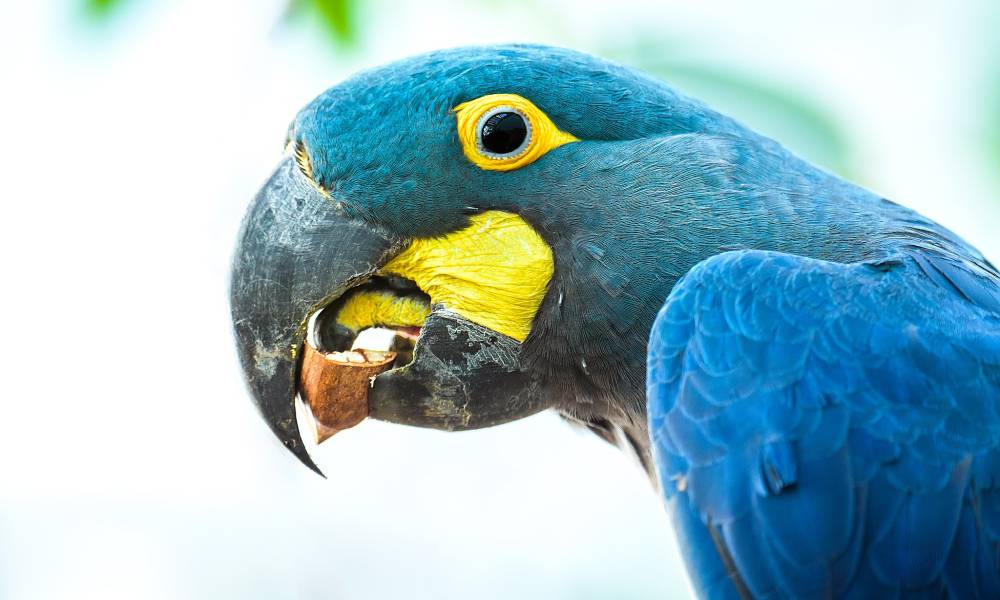
Ecosystem and Climate Change Impacts
Lear’s Macaw once played a crucial role in its local ecosystem as a seed disperser by contributing to its health and stability. This spreading of seeds by the Lear’s Macaw and other species helps promote forest growth, contributing to carbon sequestration in its habitat. As with all species, their role in maintaining biodiversity is important, and the loss of the species destabilizes ecosystems and hastens climate change impacts.
When natural climate change mitigation methods are lost, we are compelled to invest more in alternative, often costlier and less efficient solutions. The decline or potential extinction of Lear’s Macaws has far-reaching effects. Imbalances in its ecosystem cause a domino effect and negatively impact other species. Even without extinction, further declines of this species bring losses in genetic diversity, which is crucial for the resilience of ecosystems in the face of the worldwide environmental changes we are now witnessing.
Restoring the Health of the Species
While critical for restoring wild populations, expensive captive breeding programs cost from $20,000 to $50,000 per bird when facilities, staffing, healthcare, and other operating expenses are considered. Attempting to save endangered species is hugely expensive. This is described in the 2012 report in Science, “Financial Costs of Meeting Global Biodiversity Conservation Targets: Current Spending and Unmet Needs”: ‘Reducing extinction risk for all species is estimated to require in the region of U.S. $4 billion annually, while the projected costs of establishing and maintaining protected areas may be as much as U.S. $58 billion—although both sums are small, relative to the economic costs of ecosystem losses.’ These staggering costs were in 2012 dollars, and since then, they have only escalated due to inflation and the growing number of species facing extinction.
Habitat and Other Issues
As of 2019, funds invested in assisting them amounted to US$3.66 million. Much of this funding originates from governments in developed countries, affecting the amounts of money that must be raised by taxation. The same outpouring of funds is also being channeled into hundreds and hundreds of other endangered species.
Habitat loss is a major threat to the macaws and other area species. Protecting and restoring these locations can cost hundreds of thousands of dollars annually. Other conservation efforts for initiatives such as population monitoring, anti-poaching measures, and captive breeding programs also require major funding from government agencies, NGOs, corporate sponsors, philanthropists, and other sources.
Tourism
The rarity of Lear’s macaws also reduces their potential value for ecotourism. As a beautiful, charismatic endangered species, interest in birdwatching eco-tours to see Lear’s macaws could potentially generate substantial visitor spending in local communities. Their small numbers in the wild and restricted range have limited this potential. Recovery of the species could significantly increase ecotourism revenues over the long term.
Legislative efforts to keep the species from going into extinction are helping. The Convention on International Trade in Endangered Species of Wild Fauna and Flora (CITES) Appendices prohibit the commercial trade of Lear’s macaws and other species, except for exceptional reasons such as scientific research. The Brazilian Wildlife Protection Act of 1967 stipulates that animals of any species, in any phase of their development, that live naturally free and out of captivity and constitute native fauna and their nests, shelters, and natural breeding habitats are government property. This law prohibits their use, chasing, destruction, hunting, or capture, with some exceptions.
While desperately needed laws and regulations like these protect the species, they also remove revenue sources derived from trade in the birds and illegal trapping and dealing. The extent of losses is difficult to quantify but is likely notable given historical demand and is borne by local populations.
Ranching and Farming
Protecting remaining habitats also results in lost income from opportunities for activities like ranching, farming, and plantations. Preserved ecosystems provide services like erosion control, clean water, and forest products that help but do not eliminate these losses.
HOW TO HELP LEAR'S MACAWS
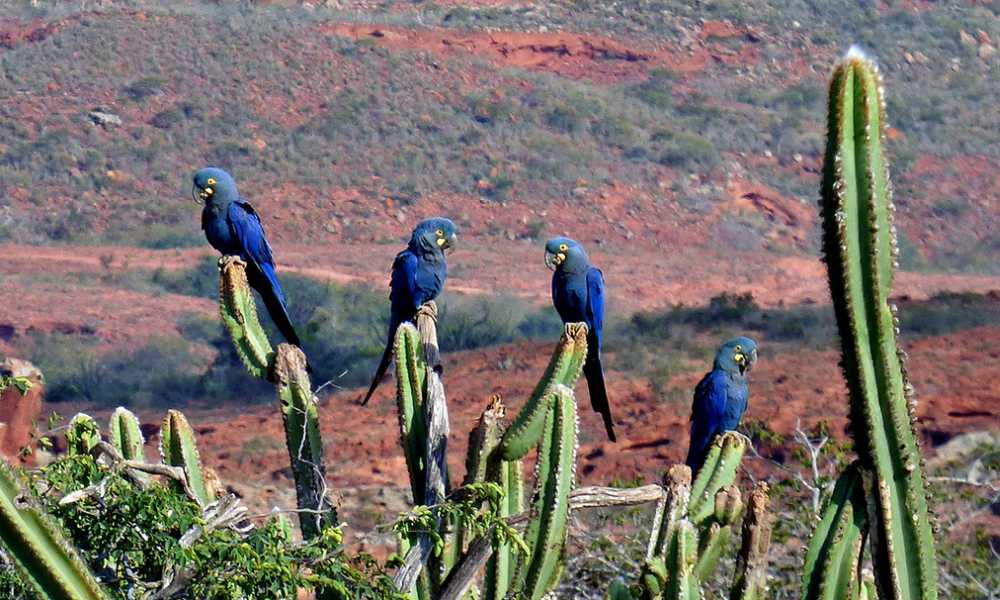
The preservation of our planet is an enormous task. Decisions we make and actions we take, however small, to help save the Lear’s Macaw or any other species contribute to the broader global fight against environmental degradation. Climate change, pollution, and habitat destruction are issues of immense scale, transcending borders and societies. They demand bold, unified action and the election of inspired leadership who will follow through on promises to take action.
Advocating For Policy Change
The leaders we choose will either prioritize biodiversity conservation and the preservation of the planet, or we will face unbelievably dystopian consequences, some of which are already becoming visible to us, such as soaring temperatures, flooding, forest fires, and more. If not checked, these symptoms and others will be increasingly devastating. Advocating for robust, comprehensive local, national, and international policies begins with strong leadership, resulting in impactful and lasting conservation actions for Lear’s Macaw and us.
Habitat Destruction
Habitat destruction, primarily caused by human activities such as deforestation and agriculture, is a significant factor contributing to the diminishing population of Lear’s Macaw. Expanding agricultural frontiers and logging to meet global consumption demands directly threaten the macaw’s natural habitat, shrinking the spaces where these birds can feed, breed, and thrive.
One of the most impactful actions consumers can take to help curb habitat destruction is choosing products from sustainable agricultural practices. These farming methods aim to preserve the environment, protect biodiversity, and promote animal welfare while providing social and economic benefits to local communities. By choosing these products, consumers can drive demand away from those that contribute to deforestation and habitat destruction. Organizations that support these efforts are the Rainforest Foundation and the Forest Stewardship Council (FSC).
Reducing waste is another key action, particularly in food and materials derived from forests. By minimizing waste, the demand for new products and, by extension, the pressure on natural resources decreases. Supporting companies committed to responsible sourcing and with robust environmental policies in place sends a strong message to the broader industry about consumer expectations for sustainability.
Raising awareness about the impacts of deforestation on wildlife like Lear’s Macaw is also crucial. By educating others about the connection between their consumption habits and global deforestation, people can encourage more sustainable lifestyles. Collective advocacy can lead to policy changes. Joining or supporting environmental organizations, participating in local advocacy efforts, or using social media to amplify the message can all contribute to pushing for stronger policies to curb deforestation.
Promoting and implementing sustainable practices, advocating for better policies, and educating others, people can contribute to protecting vital ecosystems like the ones Lear’s Macaw depends on for survival. These collective efforts can help turn the tide against habitat destruction and provide a lifeline for species pushed toward the brink of extinction.
Global Climate Change
Although interlinked with habitat loss, global climate change is an independent existential threat to the macaws and all creatures, including us. It is disrupting the ecological rhythms that species rely upon, leading to erratic seasonal changes, the unpredictability of food sources, and the transformation of a once-hospitable planet into a hostile, unlivable world. A major hurdle for Lear’s Macaw to surmount.
As individuals, we must mitigate the impact of climate change by reducing our carbon footprint. This means adopting a more plant-based diet, choosing public transportation, and, over time, switching to electric vehicles, minimizing energy consumption by using energy-efficient appliances, or sourcing energy from renewable providers.
Individual actions to reduce the products that promote climate change are important. Critically, the changes to Earth’s climate are an existential crisis that requires united efforts by all of humanity if it is to be defeated. This requires that all of us take a stand and ensure that the election of those who will prioritize clean energy, reduce greenhouse gas emissions, and support climate resilience is achieved. There is simply no other answer to this problem unless countries and those who lead them work in concert.
Supporting Ethical Ecotourism
Tourism can significantly impact communities living near Lear’s Macaw habitats. However, it is imperative that these tours are low-impact and they respect the rights and cultures of the local people. The essence of true ecotourism. Funds generated from ethical tourism can become a powerful tool and incentive for protecting natural habitats and the diverse species they house.
Educate Local Populations
Those residing near the Lear’s Macaw habitats can play an instrumental role in the bird’s conservation. Educating these communities about the macaw’s ecological significance and the economic benefits derived by the community from their protection is of utmost importance. When implemented properly, initiatives like community-led tourism, sustainable agriculture, and conservation-driven enterprises provide economic incentives that promote preservation and improve livelihoods.
Refuse to Participate in Illegal Pet Trade
Individuals can contribute significantly to reducing the threat to Lear’s Macaw by refusing to participate in the illegal pet trade. This includes not purchasing, keeping, or selling these birds or other endangered species as pets unless under specifically regulated and authorized circumstances. It’s essential to remember that the charm of owning an exotic, endangered pet comes with an enormous cost to the species and its survival.
Taking a stand against the illegal pet trade goes beyond personal choices. Advocating for stronger penalties for wildlife trafficking can create a more significant deterrent for those involved in the trade. This could include lobbying for stricter laws, supporting politicians who prioritize wildlife conservation, and spreading awareness about the legal and environmental consequences of wildlife trafficking.
Strict enforcement of laws and regulations is also crucial in combating the illegal pet trade. By pushing for adequate funding and resources for enforcement agencies, individuals can help ensure these laws are effectively implemented. This can involve efforts like writing to lawmakers, signing petitions, and supporting organizations that work towards these goals.
Supporting Conservation Groups
Helping organizations dedicated to protecting endangered species, like Lear’s Macaw, is a great way to make a difference. Non-profit organizations such as BirdLife International, the American Bird Conservation, and the World Wildlife Fund (WWF), through financial donations, volunteering, spreading the word about their mission, or participating in their campaigns, can greatly boost conservation endeavors.
All species and ecosystems are connected. The decline of Lear’s Macaw is not an isolated event. Species extinction, or the decline of populations, affects the entire ecosystem. We are all connected, from the smallest of species to the largest among us. Enhancing our knowledge of global biodiversity and understanding the relationships between species within our planet’s biosphere can bolster our appreciation for this interconnectedness and the vital role each species plays in preserving the ecological balance.
In Conclusion
The conservation of Lear’s Macaw involves a combination of individual and collective actions. Each step we take, whether it’s supporting sustainable tourism, refusing to engage in illegal wildlife trade, backing conservation groups, or advocating for effective policy changes, adds to a safer future for these stunning birds. As we labor to protect the Lear’s Macaw, we also safeguard the vibrant biodiversity they symbolize, and the time to start is now.

